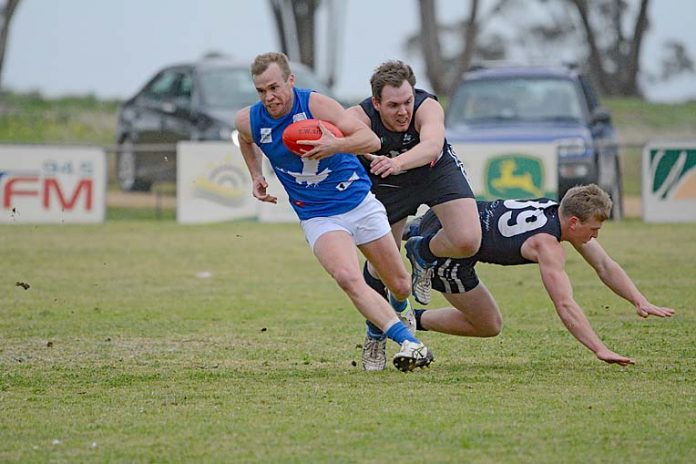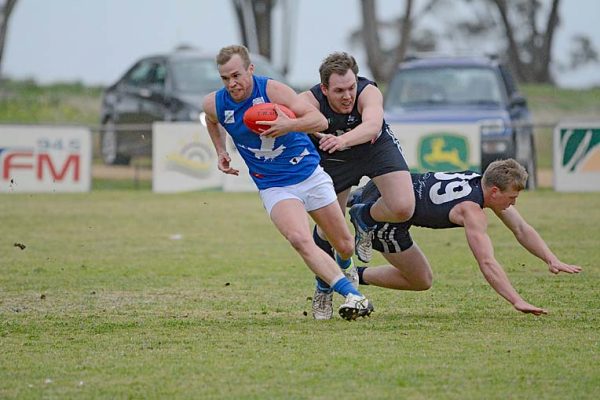

FOOTBALLERS in the Limestone Coast waited with anticipation for the COVID-19 updates from South Australian Premier Steven Marshall last weekend, but there is still no clear pathway to a season ahead.
According to stage two restrictions non-contact training can begin on Monday, May 18, with three groups of 10 allowed on any oval, sticking to additional protocols provided by the SANFL body.
The list of additional protocols is of course extensive, under the Australian Institute of Sport’s framework for rebooting sport.
In a nutshell training for sport can recommence, providing it is outdoors, with a maximum of 10 participants in any of three groups, which are not to cross over.
It must be non-contact, with football limited to non-contact skills training.
The use of shared equipment and facilities will be limited, along with people present at training facilities, such as parents or carers, with one per participant.
Unnecessary co-mingling is discouraged, which includes changerooms.
Clubs are recommended to adopt a “get in, train, get out” approach, to change and shower at home and not to hang around after the session to socialise.
From there it goes on to speak about cleaning of venues and personal hygiene, training of staff in COVID-19 protocols along with the relevant signage to be in place.
It is a step in the right direction, but some roadblocks still remain.
For the Kowree Naracoorte Tatiara league cross-border travel restrictions and a lack of crowds are the two biggest issues.
KNT president Peter McLellan said he was yet to look at the new restrictions in detail, but said there would be a “bit to do” before teams could hit the training track, let alone play.
As for a return to play, he said the border restrictions would be one big issue for the league.
“We have Kaniva Leeor across the border and Border Districts, half their supporters are on the other side,” McLellan said.
“They do have Goroke games so it is a big issue for us.”
Apart from that, McLellan said it was simply a case of no crowd, no play.
“We need to have a crowd of at least 500 people,” he said.
“We cannot start without a crowd, everyone knows that.
“If clubs have a gate of around 500-plus people that is a good day.
“It is good for the towns as well – the pub sells the beers, the delicatessen sells the bread, the butcher sells the steaks.
“All the money goes back into the community, so without a minimum of 500 people there is no point.”
McLellan said he thought many clubs would have done all of their fundraising, with cattle clubs, lamb sales and grape harvesting at vineyards.
That would provide money in the bank, but the social aspect of a club – which also brings in money – was still missing.
“I think clubs would have a reasonable amount of money sitting there,” he said.
“But they are not doing their Thursday night teas which I think is the biggest thing I am missing, that interaction Thursday night catching up with everyone.”
As for training McLellan said the new restrictions would be covered, but it was the lack of a return-to-play date which was also causing issues.
“We can train in small groups and clean the club, but when we start on Saturdays it nearly has to be normal,” he said.
“The restrictions might lift mid to late August which is too late for the seniors.
“We need 11 weeks to get one full round plus finals in to make it meaningful and a fair comp.
“We just need a start date with a crowd.”
However, despite the issues faced by countless sporting organisations around the country, McLellan said there were more important things to worry about.
“When you look around Australia, football and rugby and netball is not that important when people are crook,” he said.
SANFL football operations coordinator South East Michael Mourbey said he accepted without crowds in place it would be a tough decision to return to a “normal” season.
Mourbey said clubs needed the gate takings and other income from game days to survive.
He said the change in restrictions was a step forward, but there are a lot of requirements to do that training.
“It is a small step forward, but at the end of the day we still have not got a start date for a season because there is still a lot to work through as far as being able to have crowds in, which at the moment is not allowed,” he said.
“Also the border, particularly for the South East being still shut, which has a huge impact on how we operate our three leagues down here.
“There is still a lot to work through.”
Mourbey said the SANFL was in constant contact with the government regarding the COVID-19 situation, but until the border and crowd issues were resolved it was hard to see a season going ahead.
“I think all the leagues in the South East are really only wanting to return if they can get crowds in,” he said.
“That is the priority and I guess we are not going to see anything on that until probably in another three or four weeks when the government is able to asses how well the new training restrictions and the whole COVID situation is travelling.”







